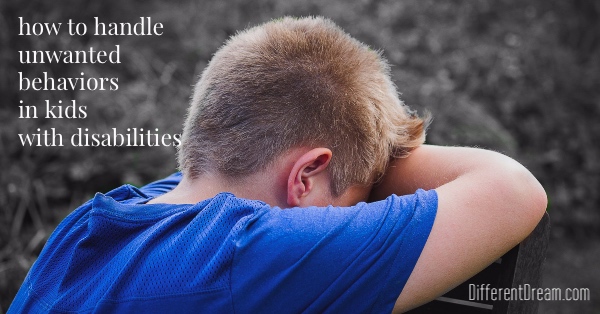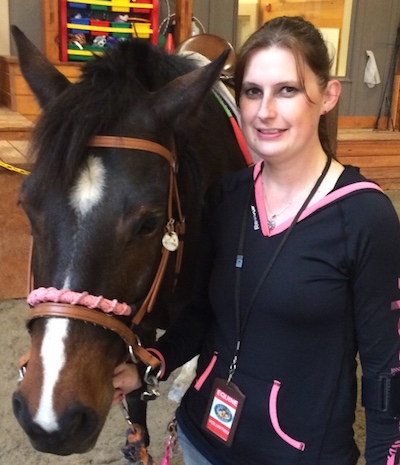Behaviors in Kids with Disabilities

Behaviors in kids with disabilities are something we like to sweep under the rug and ignore. But Trish Shaeffer, mom to 3 sons with disabilities, is transparent about her boys’ behavior issues. In this guest post, she deals with the topic head on.
Behaviors in kids with disabilities–let’s talk about them.
Anyone who says their child with a disability is a perfect angel is lying. In my experience around the age of 9, you’ll see behaviors in your child similar to the terrible 2’s or 3’s. I think this is because children starting to notice their disability. They get frustrated with their own body and possibility compare themselves to their peers or siblings. This is true even if they have an intellectual disability.
My son Alex may have the mindset of a 4 or 5-year-old, but he understands that he is different. He has a temper and holds his wheelchair wheels so you cannot push him or he refuses to push himself. He has epic meltdowns. He will throw toys or bite or hit. People see his big smile and say he’s such a sweet boy and well-behaved. They need to spend some time with him at home. As we know, children tend to display behaviors in a safe place such as home.
Despite his meltdowns, I give Alex space and time to cool down while giving him options to communicate his frustrations. Communication of feelings is hard for Alex. He can talk, but he cannot express what’s really going on. Is he mad, sad, in pain? Sometimes we don’t know. We have a visual chart for pain and feelings for him to use when he cannot express what’s bothering him. He is also learning to use the same chart in school. Many can be downloaded and printed out online.
Right now we do wheelchair time outs. We put him in a safe place during meltdowns and leave him to cool down. Those time outs are timed. It took trial and error to find the amount of time that works for calming him down. For Alex it’s a half hour, but it could be different for your child.
We also take away his iPad time for the day, which helps. If your child uses the iPad as a communication device, this may not work. You’ll have to look for another motivator such as removing a favorite toy, snack, or TV show.
We make a big deal when Alex expresses his feelings verbally and without a meltdown. This instill the concept that it’s okay to have feelings and to express them in a healthy way. We also talk about his feelings when he’s calmed down after a meltdown. This doesn’t always work, but it’s still good to let him know he’s not alone. It shows him that adults, even Mommy, can have a bad day.
Remember, no child is perfect, disability or not. You and your child do not have to meet society’s expectations of what is normal or perfect. Some days will be harder than others. Some days our kids will push us and give us grey hair. When that happens, it’s okay to walk away and regroup. You may feel like you’re heart is breaking watching your child cry or scream. Pick up the pieces of your heart and keep going. On days when you are at your wits end, leave a comment here. We all have your back. We will cheer you on!

By Trish Shaeffer
Trish Shaeffer is the mom of 3 active boys with special needs. She’s a peer supporter for Parent to Parent and volunteers with the United Cerebral Palsy Network, Special Olympics, and the United Way. She’s also an equine volunteer at Leg Up Farm. She’s married to her best friend and biggest supporter, Chris Shaeffer.
Subscribe for Updates from Jolene
Related Posts
Jesus Loves Me This I Know
Mark Arnold takes comfort and encouragement from his son’s rendition of “Jesus Loves Me,” which has been shared with so many.
Greater Love for Caregiving Parents
Karen Wright explains how her own grief about her son’s disability has created in her a greater love for caregiving parents.
Does God Speak Dutch?
Guest Blogger Steve Harris ties a favorite Christmas movie to a favorite poem to bring encouragement to special needs parents.






0 Comments